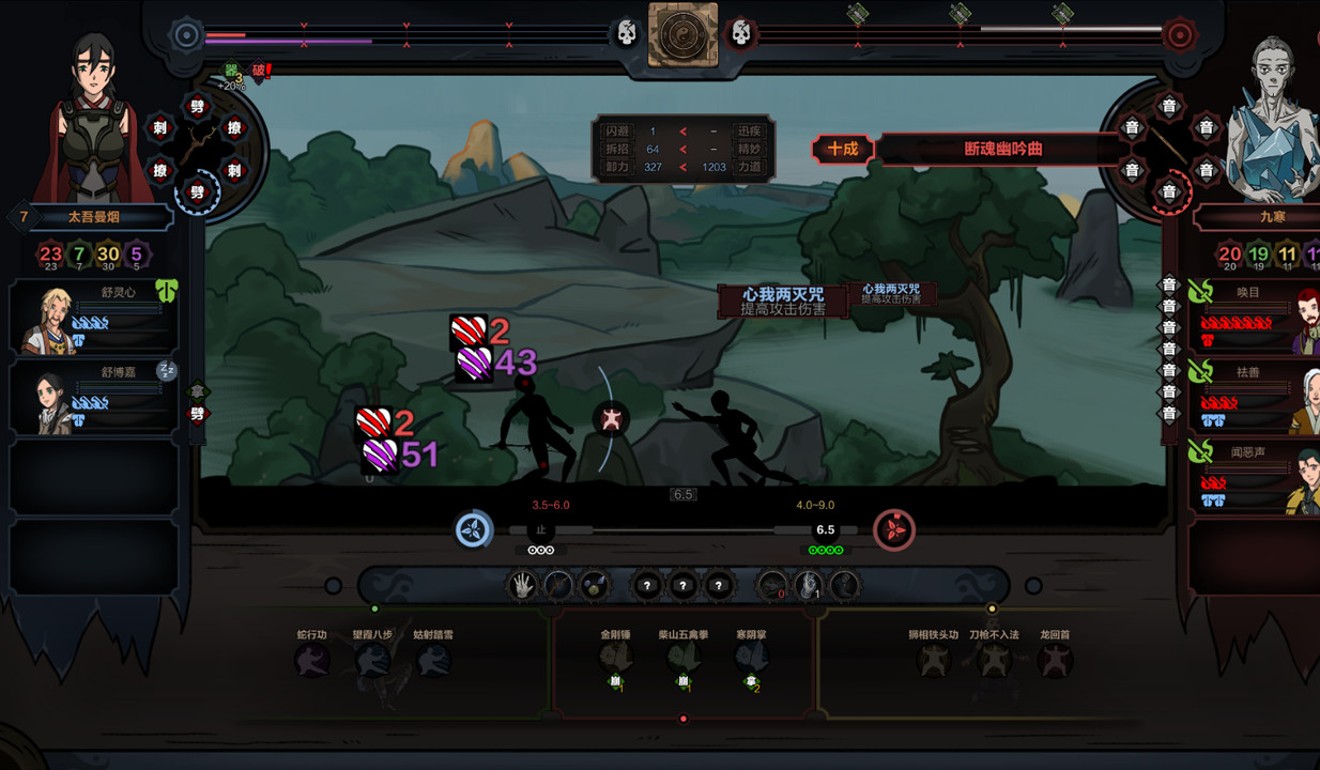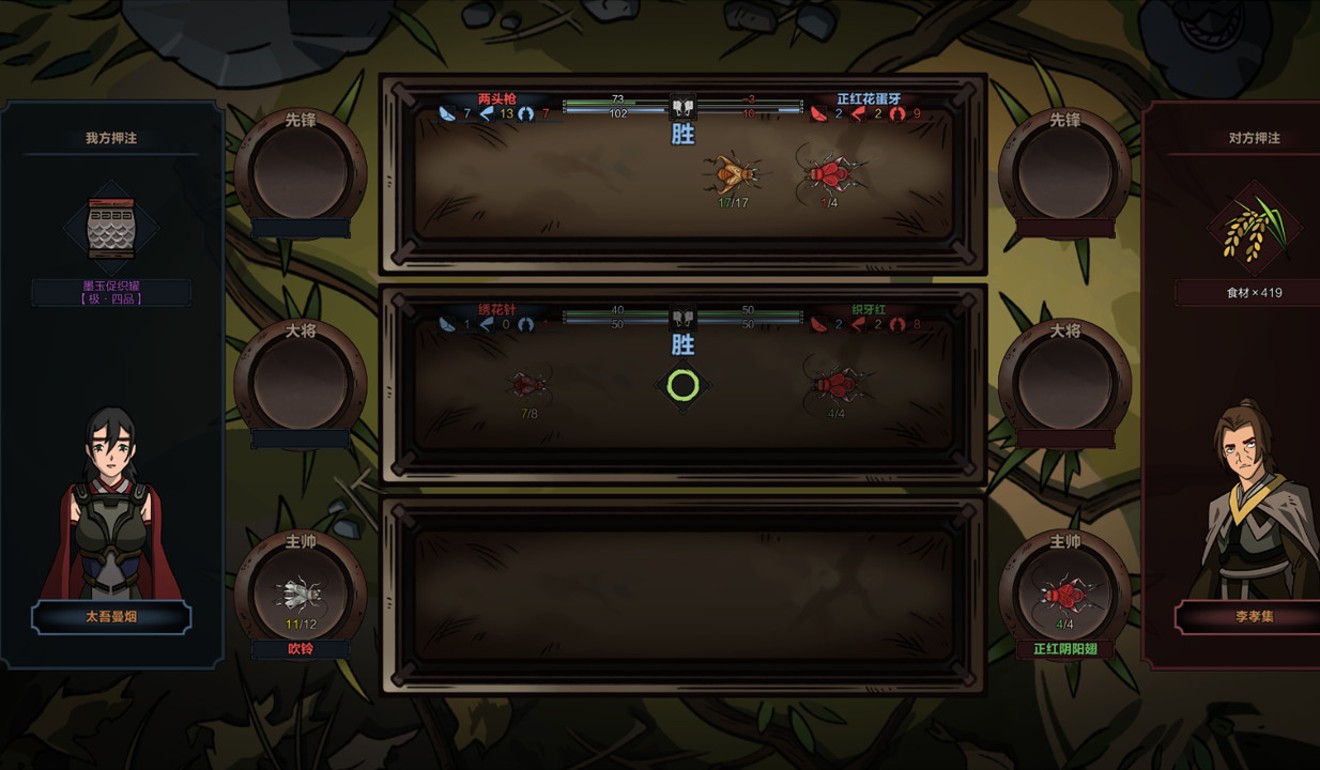
China’s hottest new game is a wuxia universe created by an amateur coder
Imagine Dungeons & Dragons and The Sims set against a background of Chinese mythology and wuxia tales.
That is an apt description of The Scroll of Taiwu, on track to break sales records since its release on the Steam games platform on September 21. It took just three days to sell 100,000 copies, a week to triple the number, and 15 days to reach 600,000, according to its developers.
During a weeklong public holiday in China that ended on October 7, The Scroll of Taiwu ranked among the top five most played games on Steam, with a peak of some 72,000 users playing simultaneously. Last week the Chinese-only game still had a peak simultaneous player number of 61,000, surpassing big names like Assassin's Creed Odyssey.
The unexpected success of the title highlights the growth of original Chinese indie games as hard core players look for alternatives to the similar looking mobile titles dominating the market. China’s indie game developers are relying on US platform Steam, which has not officially launched in China but is not blocked by Chinese censors either, to sell their titles in the country.
Valve Corp’s Steam has an estimated 20 million Chinese users playing games that would otherwise have to be approved by regulators for domestic use – a process that has been stalled for months as Beijing tightens scrutiny of the sector. While big companies like Tencent have used Steam to publish titles overseas, independent labels are using it as a workaround to reach Chinese players and monetise their games amid the regulatory crackdown.

“Chinese indie developers have been active on Steam for quite a while,” said Zhang Ge, a games researcher at Australia’s RMIT University. “More Chinese indie games are confident enough to release their games in [beta versions] and only in simplified Chinese.”
Another indie title, Chinese Parents – which simulates what it is like to be a tiger parent – also made it to Steam’s top sellers chart last week.
The mastermind behind the The Scroll of Taiwu identifies himself on Steam as Zheng Jie, based in the southern Chinese city of Kunming. Better known by his nickname “eggplant,” Zheng, 32, is an architect by day and an amateur game developer by night. About three years ago he joined several gamers he only knew from the internet to establish ConchShip Games with the goal of turning the wuxia universe into a video game, according to recent interviews he has had with Chinese gaming publications.
Wuxia is a fantasy genre of Chinese fiction covering the adventures of martial artists in ancient China who fight oppression and help the downtrodden - similar to Robin Hood.
In The Scroll of Taiwu, players star as a descendant of the legendary Taiwu family to learn martial arts moves to defeat enemies. They establish their own village, run various businesses, and can even start a family. Players can change the world at will, choosing to live however they want, be it a righteous swordsman, an evil master, or just ordinary town folk. When the protagonist dies in battle or of old age, he or she will reincarnate into another character as the new Taiwu, inheriting some skills from the previous generation. However, each life is unique with randomly generated maps, adventures and enemies.
The Scroll of Taiwu offers a immersive simulation of the wuxia world, perhaps too intimidatingly complex for non-hard core players. For example, every character in the game has dozens of attributes ranging from combat and cooking skills to chess playing, and players can interact with other game characters in numerous ways. There are also multiple mini-games within the game, where players read manuscripts to learn martial arts techniques, invade rogue camps, or participate in cricket fights.
But the open-world setting and comprehensive game features have got players so obsessed that they enthusiastically share anecdotes of their sometimes bizarre adventures in online forums. One player said the Shaolin Temple abbot he met was apparently a thief, while another said his virtual wife was pregnant for three and a half years, and then delivered birth to a cricket.
So far about 9,000 players have reviewed the game on Steam, with 89 per cent giving a positive review. “Being too addicting and time consuming are the only drawbacks of this game,” wrote one user who has spent 40 hours playing it.
Chinese gamers are known for their love of the wuxia genre, but most offerings in the market have been similar looking online role-plays centred around things like hack and slash, building up a character’s strength, and finding better weapons. In the first half of this year 60 per cent of the revenue from China’s gaming market was generated by mobile games, with about 30 per cent contributed by role-playing titles, according to data from research firm CNG.
For that reason The Scroll of Taiwu, more of a simulation game than strict role play, has been seen as a breath of fresh air. The game’s success is thanks to its “peculiar interpretation of the wuxia genre” as well as the lack of single-player games in China, said RMIT’s Zhang.
What is more surprising in Taiwu’s case is that Zheng, its developer, produced the game without professional coding knowledge.
Zheng told Chinese media that he developed ideas for the game with the help of computer aided design (CAD) software used in the architecture industry and spent a week walking his five teammates through his complicated designs. Their only professional programmer, who was working as an unpaid volunteer, decided to quit after a year without having written a line of code. That forced Zheng to teach himself how to use the Unity game developer engine within a month. The result was a tangled web of code heavily reliant on the “if-then-else” construct common in many programming languages.
“Professionals will never write such code because it’s impossible to debug or maintain. He seems to write code as if it’s poetry,” said Huo Ju, a Canadian-based coder with a software start-up, who has studied the code behind Taiwu.

As a Chinese literature major, Zheng is indeed serious about writing poetry. Borrowing lines from a Chinese classic, he created individual poems for the introductions to about 100 crickets that are traded by players as part of the game.
During the three years he spent developing the game Zheng got only four hours sleep each day, cut back on his day job as much as possible, and almost completely cut himself off from the outside world, he told Chinese media.
The Scroll of Taiwu sells for 58 yuan (US$8.40), which means the developers’ take so far, after Steam’s 30 per cent cut, is at least 24 million yuan (US$3.5 million).
The developers continue updating the game, with the current beta version only offering 30 per cent of its total available content. Zhang plans to hire a coder and establish a base so that everyone on the team can work together in the same physical location, according to a blog update on Steam. The game’s success has attracted the interest of several investors, but Zheng has turned them down. “I hope our team can grow in a healthy way rather than expanding blindly,” he wrote in the blog.
Zheng also needs to learn how to deal with his sudden move into the spotlight. In a series of QQ messages he said he barely slept during the first week after launch and had been treated at hospital for a cold.
Zheng, who had agreed to be interviewed for this article while he was in hospital, did not reply to follow up requests.
“Closed door bug fixing. All visits declined. Apologies!” he wrote on his bio page on QQ, his preferred method of communication.

